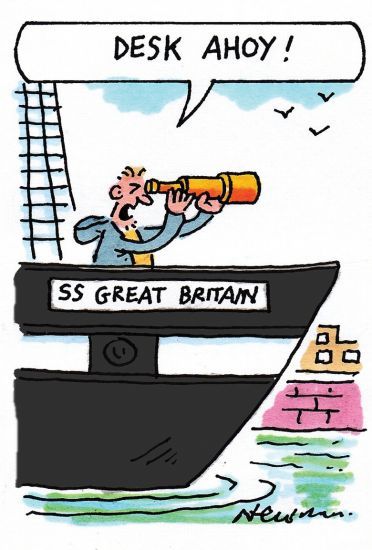
“Overcrowding in libraries and a severe shortage of desks have led to students at the University of Bristol being offered places to study at the SS Great Britain,” The Guardian reported on 1 January. Bristol has long been known as one of the institutions to have attracted large numbers of extra students following the abolition of student number controls, fully lifted in 2015. What some critics would see as a “bums on seats” approach has now led to a situation where growth in the number of bums is outpacing growth in the number of seats, with the result that students seeking somewhere quiet to revise are being offered desks in a reading room at the site of Isambard Kingdom Brunel’s steamship, harboured in a dry dock. But the university has done a service to the city’s heritage industry by making the 19th-century phrase “shipshape and Bristol fashion” relevant once again.
To the list of 1970s punk rock heroes including Johnny Rotten and Iggy Pop, an unlikely name can now be added: Nick Petford, vice-chancellor of the University of Northampton. In the BBC Four documentary Chris Packham: Forever Punk, scheduled to screen on 10 January, the nature broadcaster reveals how he was obsessed as a teenager with Professor Petford’s band Strate Jacket – Southampton’s first punk outfit – attending their gigs and even hanging around their rehearsals to secretly listen to their music. Mr Packham – who believes punk music may have saved his life by helping him cope with undiagnosed Asperger’s syndrome – interviews Professor Petford for the show to explain his fascination with the then 16-year-old’s band. He also heard from students, staff and the university’s chancellor – the broadcaster the Rev Richard Coles, part of 1980s pop duo The Communards – on the influence of punk, which surprisingly has extended into higher education leadership, in the East Midlands at least.
A professor at an elite women-only liberal arts college has appeared in a US court charged with the attempted murder of a fellow academic. Rie Hachiyanagi, professor of art at Massachusetts’ Mount Holyoke College, is alleged to have used a rock, a poker and garden shears in the assault, according to the district attorney. The Daily Hampshire Gazette said the alleged victim suffered multiple broken bones and cuts to her face, but was not in a life-threatening condition. A college spokeswoman confirmed that the incident, which occurred the night before Christmas Eve, involved two faculty members. Professor Hachiyanagi, who reportedly told police that she had no recollection of the evening, has been placed on leave.
Dominic Cummings continues to be a lobby correspondent’s dream come true, initiating reams of coverage with a blog calling for “weirdos and misfits with odd skills” to apply for jobs in Downing Street. “At the moment I have to make decisions well outside what Charlie Munger [Warren Buffett’s adviser] calls my ‘circle of competence’ and we do not have the sort of expertise supporting the PM and ministers that is needed,” the UK prime minister’s most senior adviser wrote in a post published on 2 January. The categories where he is looking for new recruits include “unusual mathematicians, physicists, computer scientists, data scientists”, who “must have exceptional academic qualifications from one of the world’s best universities or have done something that demonstrates equivalent (or greater) talents and skills”, along with “unusual economists” who have an “outstanding record at a great university”. Mr Cummings prides himself on being an innovative thinker, yet his insistence on his recruits having attended “great” or “the best” universities sounds like civil service recruitment policy from 1920.
While Jo Johnson may have quit as universities minister, the prime minister’s brother shows no sign of stepping back from the higher education debate now that he is outside Parliament. In an interview with BBC Radio 4’s Today programme on 4 January, the younger Johnson said cutting tuition fees to £7,500 a year – as recommended by the Augar review – would be “very bad politics” and would cause “grave damage” to university finances. Warning of a “substantial impact” on the sector, Mr Johnson added that he had “grave doubts” that the Treasury would make up any shortfall caused by tuition fees cuts, The Guardian reported. He also cautioned about being “vindictive” and “punitive about universities because they were on the wrong side of a perceived culture war over Brexit”. “I think that’s completely the wrong way to go if we want to make a success of global Britain and our future post-Brexit,” said Mr Johnson.